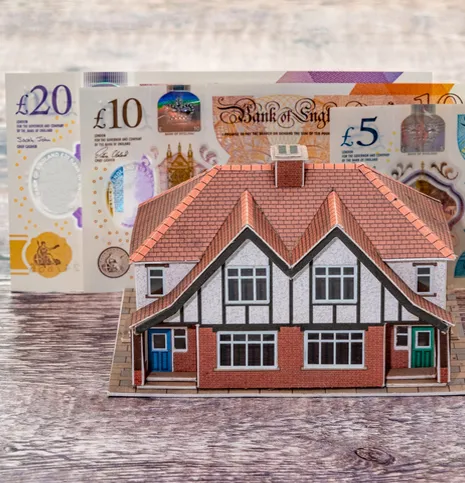These are indicative figures only and may not represent all the costs associated with each product. For more information speak to one of our remortgage brokers on 023 8235 2300.

Best Fixed Rate Mortgage Deals
On this page you can compare fixed rate mortgage deals on the market, learn about the different fixed terms and find answers in our FAQs.
Speak to a mortgage adviser
Fill out this enquiry form and we’ll contact you to book a free call with one of our mortgage experts.
"*" indicates required fields
Compare Fixed Rate Mortgage Deals
You can compare fixed rate mortgage deals currently on the market with our free best buys tool below.
What Is a Fixed Rate Mortgage?
A fixed rate mortgage is a mortgage where the interest rate you’re charged is fixed to a certain date or for a certain number of years – e.g. 4.5% interest for 5 years.
A fixed term is different from the overall mortgage term. The overall mortgage term is the total amount of time over which you pay back the mortgage. So for example, you’d take out a 25 year mortgage with a fixed rate of 4.5% for the first 5 years.
You’ll then go onto the lender’s SVR (standard variable rate) when you reach the end of your fixed rate period, unless you choose to remortgage or take a new product with your current lender.
Fixed Rate Mortgage Pros and Cons
Before deciding whether to get a fixed rate or variable rate mortgage, it’s important to look at the benefits and disadvantages of fixed rate mortgages.
How to Get the Most Out of Your Fixed Rate
Choose the fixed period you need
When you apply for a fixed rate mortgage, you can look at different period lengths. For example, a 2 year fixed rate might suit you better if you think you’ll want to look at other mortgage deals in the medium term, while a 5 year fixed rate might be better if you want the security of predictable payments for longer. It’s also important to consider how the market might change over the course of your fixed rate. If you think that interest rates are likely to increase, you might want to request a longer fixed rate. Fixed rate mortgage offers even stretch up to 10 years or beyond in some cases.
Make overpayments
Making overpayments can be beneficial if you want to pay off your mortgage sooner. This brings down the capital borrowed quicker and means that you can save on the total amount of interest you pay. If you choose a fixed rate mortgage, you’ll usually be able to make overpayments up to a total of 10% of your mortgage balance annually. If you want to overpay more than this per year, you’ll usually face a fee. You can often make larger overpayments without a fee when you’re on your lender’s SVR (standard variable rate), but you can discuss this with your broker if you’re planning to make larger overpayments.
See if you can port your mortgage
If you want to move to a new property during your fixed rate period, you may be able to port your mortgage. Porting is where you transfer the mortgage deal to the new property. While this is technically a new mortgage and involves new credit checks and income checks, it will allow you to keep your fixed interest rate. If you think you’ll want to be able to port your mortgage in the future, speak to your broker and they’ll direct you towards a lender that will be able to do this.
What’s the Difference Between Fixed Rate and Tracker Rate Mortgages?
The 2 main mortgage interest types you’ll encounter are the fixed rate and the tracker. For a rundown of the differences, read on.
Buying or moving home for the first time?
See what kind of first-time buyer mortgage rates are available to you as a new homeowner or learn more about the moving house mortgage process.
Looking for a fixed mortgage for your rental property?
You’ll need a mortgage for buy-to-let. Compare rates, learn about the process and read our FAQs.

How Long Does a Fixed Rate Last?
Residential mortgages typically have fixed terms that last between 1 and 10 years.
1 year fixed
The shortest fixed term available is 1 year. 1 year fixed rates are extremely rare and only available from specialist lenders. They’re usually based on very specific needs, therefore they typically come with more expensive rates than other fixed rate products.
2 year fixed
3 year fixed
Most 3 year fixed rates are needs based. They’re suitable if you want to stay in your property now – and therefore want stability – but don’t want to be tied in for as long as 5 years and may be thinking about moving in the future. They’re offered by fewer lenders than 2 or 5 year fixed products, which can be reflected by a higher rate.
5 year fixed
5 year fixed mortgage rates, like 2 year fixes, are common and popular among borrowers. You may want a 5 year fix if you intend on staying in your property for the medium to long term, but are open to/expect your situation to change later on. It provides stability without asking you to think too far in advance. Use our best buys tool above to compare the best 5 year fixed rate mortgage deals currently on the market.
10 year fixed
Typically, the longest fixed term you could get on the high street is 10 years. A 10 year fix is suitable if you plan on staying in your home for the foreseeable future and/or would like to budget for the long term with a set monthly payment. To compare the best 10 year fixed rate mortgage products on the market, select the “more than 5 years” option under Initial Rate Period on our best buys above.
Longer than 10 years
Sometimes lenders will offer fixed rates for more than 10 years – but this is very rare. Talk to one of our expert brokers if this is something you require.
What Happens When My Fixed Rate Mortgage Ends?
You revert to the lender’s SVR
After your fixed rate ends, you’ll be transferred onto your lender’s SVR (standard variable rate) for the remainder of the mortgage term. A lender’s SVR will normally be significantly higher than whatever introductory deal you were on and can change at any time, influenced by the broader interest rate environment or lender’s pricing.
Key points about the SVR:
- You’ll face higher payments: the SVR is generally higher than fixed rates, meaning you could see an increase in your monthly mortgage payments
- The rate will fluctuate: as the SVR is variable, your payments can go up or down, which introduces uncertainty in budgeting
What Are My Options After My Fixed Rate Ends?
How to Choose the Best Option When Your Fixed Rate Mortgage Ends
- Keep an eye on overall interest rate trends: if rates are expected to rise, locking in a new fixed rate might be beneficial.
- Consider your long term financial goals: if you’re planning major life changes, like moving house or changing jobs, how you handle your mortgage might change.
- Reassess your financial situation: ensure any new mortgage deal is affordable not just now but in the long term, especially if you are considering another fixed term.
- Consult a mortgage broker like John Charcol: speaking to a John Charcol mortgage adviser will provide you with insight into the best mortgage rates available and help you find make the right decision – one that’s tailored to your personal financial situation. Contact us on 0808 258 6890 to learn more about fixed rate mortgages and your options.
How Can John Charcol Help?
Process for Purchase/Remortgage
1. Meeting with advisers and mortgage research
When you phone us, you can either arrange a phone appointment with your adviser or a face-to-face meeting – whatever suits you. Your adviser will ask you some questions and, once they have all the information they need, they’ll go away and find the best mortgage for your circumstances and needs. They’ll also arrange a follow up call to present you with what they’ve found. It may require more than one conversation to gather all the right information, depending on where you are in your property search.
2. Decision in Principle
3. Offer on property/proceed with remortgaging
After you’ve secured a DIP (Decision in Principle), you’ll be in a great position to make an offer on a property or move forward with remortgaging.
4. Pre-application and submission
Following the acceptance of your offer on a property or the decision to move forward with remortgaging, we’ll send you some information which explains all the documents we need to submit to the lender. You’ll be assigned a client relationship manager who’ll check and submit certified copies of your documents; they’ll liaise with both you and the lender. Your adviser will then submit the fully packaged mortgage application.
5. Lender underwriting and valuation
The lender will underwrite your application; this basically means they’ll verify the information you’ve provided and review all your documents for themselves. They’ll also instruct a valuation for their purposes on the property to make sure there are no significant problems with it.
6. Mortgage offer
If the lender is happy with everything they’ve found, they’ll send you a mortgage offer. They’ll also send us a copy.
7. Conveyancing
After you’ve accepted your mortgage offer, you’ll go through the legal part of the process, known as conveyancing. This is where the solicitors/conveyancers draw up contracts and organise the actual, legal purchase of the property or the remortgaging process. If you’re purchasing, you’ll also need to arrange buildings insurance at this stage, making sure it’s in place from exchange.
8. Exchange and completion
If you’re buying a property, your conveyancer/solicitor will exchange contracts with the seller’s conveyancer/solicitor; it’s at this point that you would put down your deposit and be legally bound to the property. The purchase will complete when the money is transferred on an agreed-upon date.
If you’re remortgaging, then there’ll be no exchange of contracts, nonetheless legal work will be required as you’re switching lenders. Your conveyancer/solicitor will instead set a date to draw down the funds and pay off your existing lender(s) once the mortgage offer’s released.
Get a Life Insurance Quote
Life insurance protects you, your family and your home, including if you’re unable to meet your financial obligations due to illness, accident or even death. Get a quote now.
Get a Conveyancing Quote
If you’re purchasing a property, you’ll need a conveyancer. Luckily, John Charcol can refer you to an experienced conveyancer that suits your budget and timeline.
Fixed Rate FAQs
Is a fixed rate better than a variable rate?
Fixed rate mortgage offers have certain benefits that variable rates don’t.
Some benefits with fixed rates include:
- You always know how much interest you’ll pay
- You can budget according to how much interest you’ll pay
- They’re stable
On the other hand, variable rates like discount or tracker rates may offer benefits that fixed rates don’t.
Some benefits with variable rates include:
- If the rate falls, you could end up paying less interest and benefitting from a lower monthly payment
- They tend to offer more flexibility regarding ERCs than fixed rates which means you’re not as tied in should you want to switch deals
Find more information on the different mortgage options in our mortgage types guide.
Can I get out of a fixed rate?
Can I remortgage during a fixed term?
It is possible to remortgage during your fixed term or introductory deal however you’ll likely face ERCs, which can make remortgaging more money than it’s worth. If you think you might want to remortgage soon after you take out your mortgage, you could look at a 1 or 2 year fixed rate mortgage instead of a longer term.
Can I remortgage on to a fixed rate?
Many people will remortgage onto a new fixed rate as their current introductory deal is about to end to avoid being transferred onto their lender’s SVR. Check out the different remortgage deals available with our best buys tool. You can also work out how much you could potentially save by remortgaging onto a new rate with our mortgage comparison calculator.
What is the best fixed rate mortgage deal?
There’s no single best fixed rate mortgage deal. What’s best for you will depend on your circumstances. For example, do you intend on staying in the same property for the foreseeable future or do you intend on moving after a couple of years? Asking these kinds of questions and discussing them with your adviser will help them figure out whether a shorter or longer term fix will work for you. There’s also an option to offset your savings against your mortgage, so that you pay less interest. Speak to one of our advisers on 0808 258 6890 as they’ll tell you which product would best suit you.
